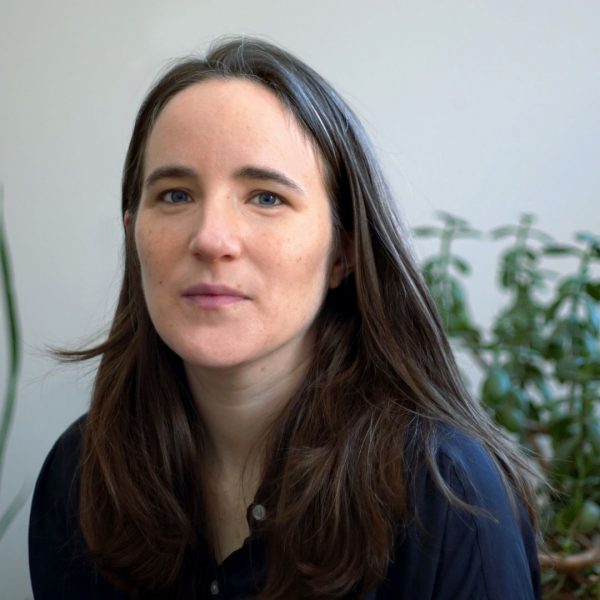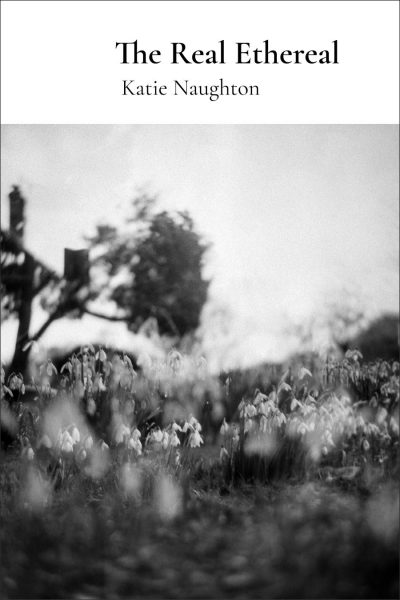“Naughton is a spare poet of life’s wild abundance”

Published by Delete Press on August 1, 2024, The Real Ethereal is Katie Naughton’s first full-length book of poetry.
“It feels both wild and mundane to have these private words out in the open,” Naughton said. “I hope that there will be poems in the book that keep its readers company in the same way I have been kept company by some of my favorite poems.”
Naughton, who earned her MFA in Poetry at CSU in 2016, began working on the manuscript in graduate school under the mentorship of poetry faculty Dan Beachy-Quick, Matthew Cooperman, Camille Dungy, and Sasha Steensen.
Praising The Real Ethereal as “the worthiest kind of work,” Beachy-Quick commended Naughton’s ability to reveal the profundity layered within everyday living:
“Near the end of her stunning debut, Katie Naughton asks a simple question, not so simple at all: ‘and what is mine?’ The question tunes the ear to the undergirding ethic these poems explore, a frequency that cancels the static of capital’s all-too-easy ‘time is money’ to reveal the deeper economy, one that knows the real, letter by letter, is embedded within the ethereal, with an E as the only excess, calling out so quietly the heart’s inner urgent more.”
He continued: “More what? More days, more time, more of the honest inheritance that makes a life—for any of us—mine. Naughton is a spare poet of life’s wild abundance, practicing poetry’s oldest motions, the garland and the crown, weaving together inner life with worldly experience, stitching day to day, asking what the hours are in hopes of honoring what the days bring.”
A current doctoral candidate in the Poetics program at SUNY – Buffalo, Naughton has taught courses in rhetoric and composition, introductory creative writing, and poetry. She is currently at work on her dissertation, which explores “opacity and non-self-identity in experimental poetry by women.”
Naughton has previously published two chapbooks, Study (above/ground press, 2021) and A Second Singing (Dancing Girl Press, 2023), while a third, Debt Ritual, is forthcoming by Bunny/Fonograf Editions in 2025. In 2023, she was named a winner of the Academy of American Poets University Prize for “Easy Listening.”
You can purchase your copy of The Real Ethereal from Asterism Books here. Below, find Naughton in conversation about her debut collection with CSU English Communications Coordinator, Emily Harnden.
 Q&A with Katie Naughton
Q&A with Katie Naughton
For those who are unfamiliar with your work, how would you describe The Real Ethereal? What would you say you’re thinking about most in this book?
The Real Ethereal is an investigation of time and memory, language’s role in perceiving and articulating the passage of time, in becoming memory. At its core is the jarring experience of loss and connection–personal, environmental–opening and re-opening perception to what Robert Duncan calls the “everlasting omen of what is” in all its detail and complexity.
I love how these poems expand and encompass so much: Time, love, money, labor, family, climate, home. What feeling or question would you say is connecting these themes?
I’m interested in the book in simultaneity, in the unit of time as something that gathers all manner of activity and experience into it. So you could say the day, the hour, the minute, the second gathers all of these threads together. Everything is happening all the time. In these poems I try to notice that, which is of course impossible, but it’s a form of realism, I think, that I’m interested in attempting, and which drives the linguistic and syntactical experimentation of the book out of necessity.
In the opening poem, “day book” I found myself returning to the line, “I try to make / choices about what choices to make”—how do you see this anxiety echo throughout the poems?
To me this line echoes most as a reflection on form, a way of understanding why I wrote the sonnet forms of “Hour Song.” The form acts as a constraint and everything else has to happen within it, as it does in a day or in an hour. Having that small form helped me draft the poems because they couldn’t become too overwhelming, and it helped me fill them to brimming with everything that was overwhelming because I knew how to contain it.
You started writing The Real Ethereal around the time you began your MFA at CSU—about a decade ago. How has the book changed and developed as you too have grown as a reader, artist, and person?
I haven’t revised the oldest work too much, but it did take a while for the book to find its ending, which emerged out of the process of growing into my adulthood. The early work of the book emerges out of childhood and the family of childhood – by the end, I’m looking ahead to the family I am making myself through marriage and the possibility of children. I also think about something I once saw Joni Mitchell said about her early albums – I don’t think I can sing this same way anymore, and I’m glad I wrote this book while I could.
I’m fascinated by the way The Real Ethereal centers units of time, and questions what it means to spend a life living in the minutes, hours, days. How would you describe the way these poems contend with time as container/currency/constraint?
I would say it wasn’t exactly a direct or directed attention to these specific units of time, but rather patterns that I noticed in the poems’ attentions and language that helped me to group them and to differentiate some of the formal structures I was working with. I think that attention to different units of time came out of the confounding experience of shifting attention among momentary time, life-time, and even planetary time that I think both grief and love, whether personal or ecological, instigate.
The book is broken into four sections: day book, hour song, the question of address, and the real ethereal. How did you arrive at this structure / order? Did the shape of the book change throughout the revision process?
Most of the poems in the book were finished before I really started to think about how to group them into sections, but there are, in retrospect, some distinct movements happening within the sections. The section “Hour Song” contains the oldest intact poems in the book and to me in many ways is the core of the work. So “Day Book” in some ways was an effort to arrive into and contextualize “Hour Song” with slightly more concrete, longer, less-complex lines. “The Question of Address” is the second-oldest section and somewhat of an aside that interrogates the mode of lyric address, the “you,” in “Hour Song,” again concretizing it a bit more. And then “The Real Ethereal” lets the rhythms of the book dissolve and etherialize a bit more into fragment – the core of this section is a poem called “a second singing,” moving into that most momentary unit of time, the length of a breath or a heartbeat. It contains fragments from poems written earlier than those in “Hour Song” and also the most recent work in the book. There’s also, of course, some puns in these titles: “our song” in “hour song,” second as a unit of time but also the ordinal, address as in locution but also location.
In what ways has your time at CSU influenced your current poetic practice?
I’ve spoken elsewhere about how I first encountered the New American poetry and everything that came out of it at Colorado State, and the reading I did here has definitely shaped my allegiances as a poet and scholar toward linguistically and conceptually innovative work. The Real Ethereal bears the mark of the Colorado landscape, too, and the kind of ecological, environmental thinking that that landscape invites.
As current doctoral student in poetics at Buffalo, how do you negotiate writing creatively and working in an academic setting?
The great thing about the poetics program at Buffalo is that everyone has a creative as well as a critical practice, so you’re in good company and there’s a culture of supporting creative work and its interface with critical work. For me, I tend to work in seasons – my attention will be more dedicated at times to writing or revising poems and at other times to teaching or scholarship. But the critical activity of scholarship always animates creative thought, even when it’s happening indirectly.
What are you reading/listening to/watching/absorbing right now?
Mostly materials for my dissertation – most recently, Mei-mei Berssenbrugge’s archival materials at the Beinecke Library at Yale. I was focused on her drafting process during my work there this June. What’s interesting in a poet’s archive varies from poet to poet – I’ve never really been too compelled by drafts before but Berssenbrugge’s early drafts narrate her compositional process in a way that’s a such a gift to a scholar – and to a poet thinking about their own process. Also, Thomas Hardy’s Far from the Madding Crowd. I like a 19th-century novel as a form of historical escapism. When I was younger, I used to read novels to find characters who were similar to me or who could help me better understand myself and my world – as I’ve gotten older, I’ve become increasingly interested in what novels from the past capture of a world that is not reflected in our own. So far in Far from the Madding Crowd it’s a lot about tending sheep. But the pleasure is also in Hardy’s language – he’s as much a poet as he is a novelist and his sentences are each intricate little worlds requiring total attention. A lot of what I love about the descriptive and linguistic innovation of modern and contemporary poetry is there, too, in his sentences from 1874.
About Katie Naughton
Katie Naughton is a poet living in Brooklyn, NY. She is the author of the chapbooks Study (above/ground press, 2021), A Second Singing (Dancing Girl Press, 2023), and Debt Ritual (forthcoming from Bunny/Fonograf Editions, 2025). Her poetry has been published or is forthcoming in Fence, Bennington Review, Michigan Quarterly Review, Tupelo Quarterly, and elsewhere. She holds an MFA in creative writing from Colorado State University and is a doctoral candidate in the Poetics program at State University of New York at Buffalo. She is an editor at Essay Press, the HOW(ever) and How2 Digital Archive Project, and Etcetera, an online journal of poetry and poetics.